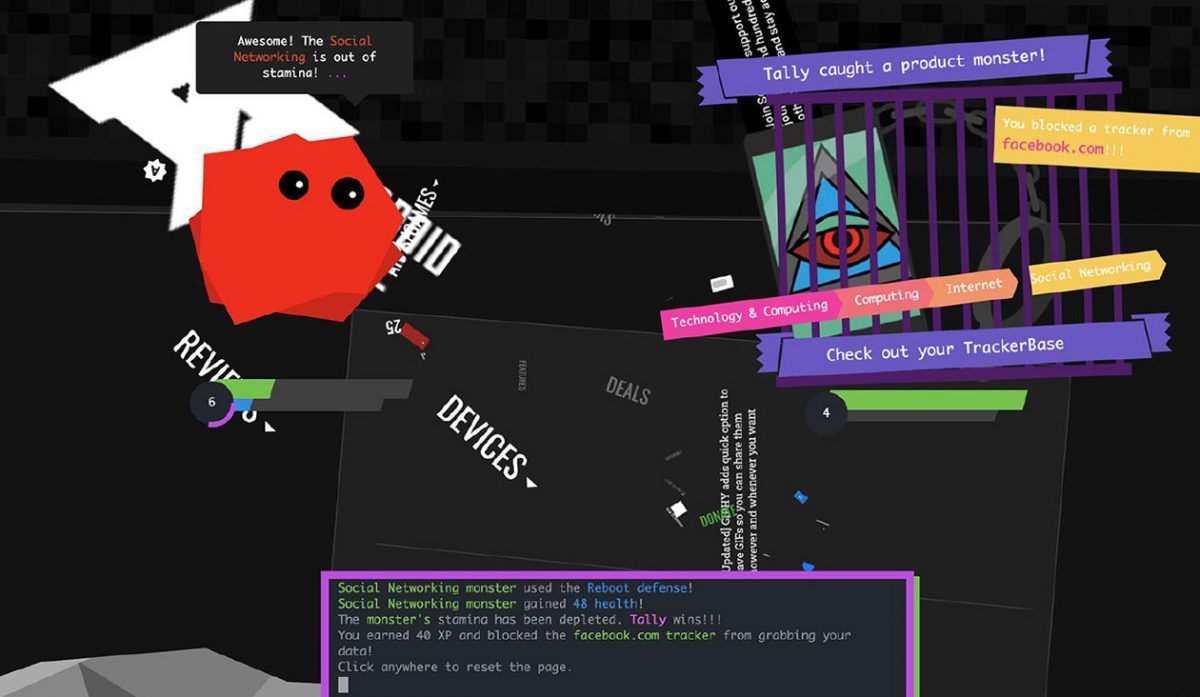Battle Online Data Tracking with Sneakaway Studio and Gallery QI
She’s a little pink blob, and she’s here to fight data trackers on the internet. On Tuesday, March 1 at 6:30 p.m. PST, Tally—a browser extension portrayed as a friendly blob that lives in the corner of one’s screen—and her inventors Joelle Dietrick and Owen Mundy of Sneakaway Studio join UC San Diego’s Gallery QI for a virtual workshop centered on issues of data privacy and ethics in the digital realm.
Attendees of the March 1 event will download the free, open-source browser extension and join Tally’s inventors and event host Amy Alexander, who is professor of computing in the arts at the UC San Diego Visual Arts Department, online for an evening of presentations, Q&As and colorful battles between Tally and data trackers. Participants can register for the event online.
Tally Saves the Internet launched in February 2021 as a direct response to surveillance and behavioral targeting online. The browser extension “gamifies” the user’s experience through battles between Tally and “product monsters,” a playful representation of very real and present online trackers. Monsters can have different difficulty levels, and their appearances correspond with the content that the user is browsing at the time of the attack; a monster on a health and wellness site, for example, can resemble an angry blender with teeth. Each time the user and Tally defeat and capture an opponent, they block that tracker from collecting their data.

“We wanted to bring Tally to UC San Diego because the university has such a legacy of socially progressive ideas, especially in the visual arts. Owen and I studied there with Barbara Kruger, Adriene Jenik, Norman Bryson, Grant Kester, Lev Manovich and Amy Alexander. Those years were formative and connected to the spirit of Tally,” said Dietrick. Both she and Mundy are UC San Diego alumni and faculty at Davidson College in North Carolina.
Tally assigns registered players anonymous usernames and never shares their data. Users can access a profile with their game statistics, including number of monsters captured, trackers blocked, badges won and more. The game also includes a leaderboard where players can interact, encouraging users to engage in reimagining a more ethical digital system.
“We started working on Tally in 2017 because we were concerned by how the internet has grown into a pervasive and automated system dedicated to capturing and selling our attention to the highest bidder,” said Mundy. “But we were also aware that people felt helpless about the topic. Tally offers critical play as a solution.”
Tally Saves the Internet is the latest in a number of games, mobile apps and data visualizations from Dietrick and Mundy’s Sneakaway Studio. Founded in 2012, the studio is behind socially critical works such as The Speed of Thinking, Mirawarri and I Know Where Your Cat Lives.
Tally was recently awarded a grant from UC Berkeley’s Center for Long-Term Cybersecurity and has been shortlisted as a finalist for LACMA’s Art + Tech Program, a 2019 Mozilla Foundation Creative Media Award and a 2019 IDFA DocLab grant.
Gallery QI is a program of UC San Diego’s Qualcomm Institute (QI), which harnesses technology to jumpstart innovation in areas including culture, energy, the environment and health. The gallery is located on the first floor of Atkinson Hall, on the UC San Diego campus at the corner of Voigt Drive and Equality Lane. All Gallery QI events are free and open to the public.